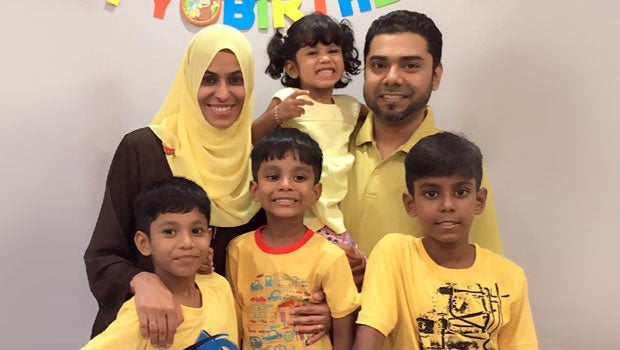
Mdm Jannathnisha has donated cord blood at all her four pregnancies.
Cord blood, a rich source of Haematopoietic stem cells (HSC), is used in treatments of blood-related diseases such as leukaemia and lymphoma. Compared to other stem cell sources, it is generally considered the safest option.
HSC can easily adapt to the patient's body, repopulate and restore cells destroyed by cancer or other blood diseases.
Many new mothers and their families still have mixed feelings about donating their baby's umbilical cord.
"This is largely due to misinformation and misunderstanding about cord blood donation. Collection of cord blood from the umbilical cord is painless for the mother and absolutely safe for her baby. It is an act of generosity, a precious opportunity for the baby to do good, right from the time of birth," said Mrs Tan-Huang Shuo Mei, Chief Executive Officer of the Singapore Cord Blood Bank (SCBB).
Ethnicity matters
In Singapore, about 40 to 60 per cent of patients needing a HSC transplant to survive are unable to find a suitable stem cell match from bone marrow donors and public cord blood banks.
Prof William Hwang, Medical Director of SCBB, explained that this is because only one in four patients can find a match among their siblings: "Patients stand a higher chance of finding a good stem cell match among donors from their own ethnic group, so it is crucial to increase the number of donors to match the ethnicity mix of our population".
Donation of cord blood to centralised public cord blood banks such as SCBB increases the number of cord blood units available to all potential stem cell transplant patients, offering them hope and a chance of a cure.
"I never questioned 'Why should I?' but rather 'Why not?'. It is wasteful to discard cord blood when I know it can help to save someone's life."
Not once, not twice but four times
For Mdm Jannathnisha Binte Mohideen Pitchay, Senior Staff Nurse at Outram Polyclinic, it was only natural to donate her baby's cord blood.
"I never questioned 'Why should I?' but rather 'Why not?'. It is wasteful to discard cord blood when I know it can help to save someone's life".
Having previously worked at KK Women's and Children's Hospital as a nurse, Jannathnisha was well aware of the need for unrelated cord blood to treat different diseases. Her husband, however, was less convinced when they were expecting their first child.
"He had so many questions. At first, he thought it involved donating the placenta which he was very uncomfortable with. However, after I explained the process and benefits to him, he supported my decision wholeheartedly," said Jannathnisha.
The couple has since donated at all four of Jannathnisha's pregnancies. Jannathnisha has also been introducing and referring her family and friends to SCBB.
Her younger sister, Shameemah, followed in her footsteps and donated cord blood at her own baby's birth last year.
The mother of one shared, "It does not take much effort to sign up for donation and it takes only a few minutes for the cord blood to be collected. It is painless and safe for my baby and me. Why not donate when something that takes little effort could save a life?"
Like her sister, she has introduced public cord blood donation to her friends and hopes to influence more to do so.













 Get it on Google Play
Get it on Google Play